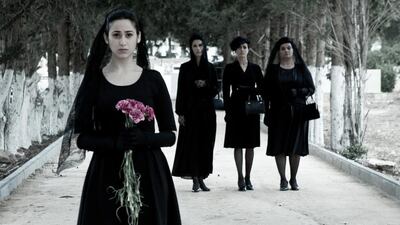Suha Arraf is best known as the screenwriter of the critically acclaimed Eran Riklis films The Syrian Bride (2004) and Lemon Tree (2008). She has also made three documentaries, the most recent of which – 2010's Women of Hamas – received 13 awards at international film festivals.
So there was much anticipation at the Venice Film Festival for the unveiling of Villa Touma, Arraf's first feature film as a director.
"When I wrote Villa Touma, I decided in the first act that I wanted to cheat you as a viewer," she says. "I wanted you to believe that you are in a period film set in the 1960s. I didn't want you to discover that it's set in 2000 and something until later."
Arraf achieves this by locking away the four leading protagonists, all women, inside a villa in Ramallah. The story begins with the orphaned teenager Badia (Maria Zreik) coming to live with her aunts, Juliette (Nisreen Faour), Violet (Ula Tabari) and Antoinette (Cherien Dabis), three Palestinian Christian sisters who have lost their status due to the 1967 war.
The sisters try to maintain an aristocratic lifestyle but, having isolated themselves, they and the villa are in a state of depression. The arrival of Badia reinvigorates the women, who decide to teach their niece how to be a proper lady by making her take piano lessons and learn French. This half of the film is like a British upstairs/downstairs period drama, with the women’s snobbery providing much merriment.
“I think the bourgeoisie are similar everywhere,” says Arraf. “The bourgeois in Palestine were like this, they behaved like this and were affected by Europe.
“They didn’t send girls to university, they brought in private teachers and they were more traditional than the regular people. They were really traditional, especially the Christian families. They were not allowed to go out, they learnt to speak English and French – but most importantly they had to be good housekeepers and know how to serve everything perfectly, because it is the job of girls to get married, to be good wives.”
So once Badia has mastered the art of being a lady, the women decide that to ensure she does not turn out like them – middle-aged unmarried women – they will find her a nice Christian husband. They go to a plethora of weddings, funerals and tea parties, but the job proves harder than they expect.
It’s in this section that we finally see the outside world and some men.
“That’s right, I hide the men,” says the director. “Look what I did – they are either injured or dead.”
The film is strongest in the moments when the men are out of the picture and we learn about the emotional state and lifestyle of these women.
It’s a unique film, which on first glance seems derived more from European cinematic traditions than Palestinian. Arraf says her personal influences are Egyptian cinema from the 1960s and Italian films of the 1970s.
The dramatic comedy is also clever in its use of metaphors to comment on contemporary society.
“Everyone is saying that the film is so different from Palestinian cinema,” says Arraf, who was born in a Palestinian village and now lives in Haifa. “But I use the same elements as my colleagues – I use the colours of the flag, I use the wall of the house to symbolise the wall surrounding Ramallah. There is a lot of subtext in my film and this is the way I like to tell stories.”
It’s the work of a director who is clearly confident in her own abilities. As she says: “Making a drama is not easy, far harder than making a documentary and we had a tight budget, but, more importantly, you need to be really confident about yourself to make a drama where you close yourself inside a room and shoot just four women.”
artslife@thenational.ae


